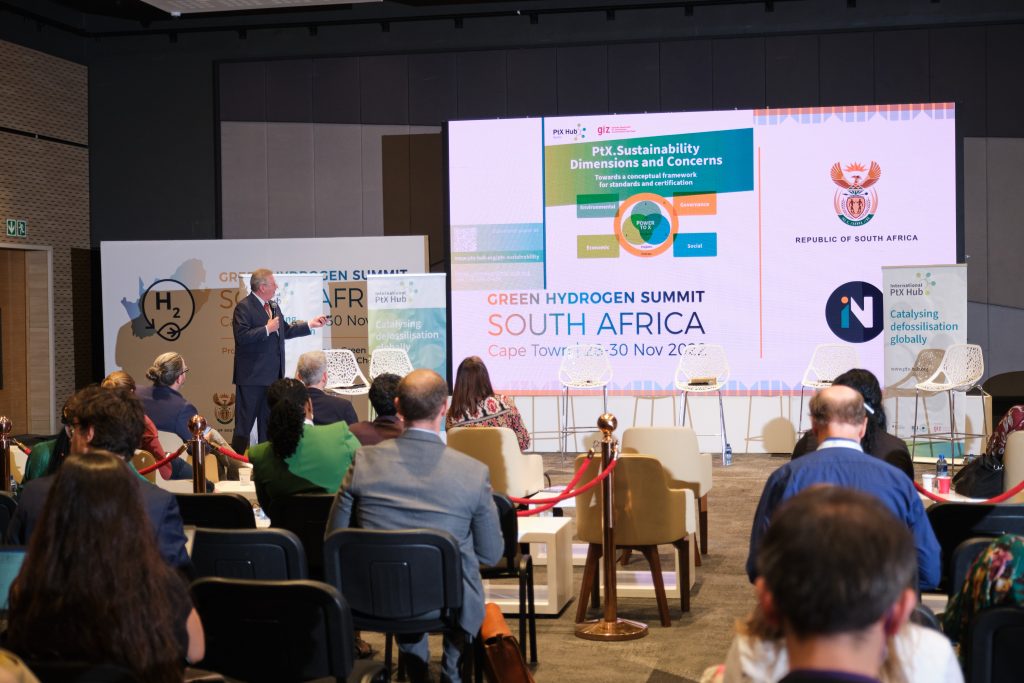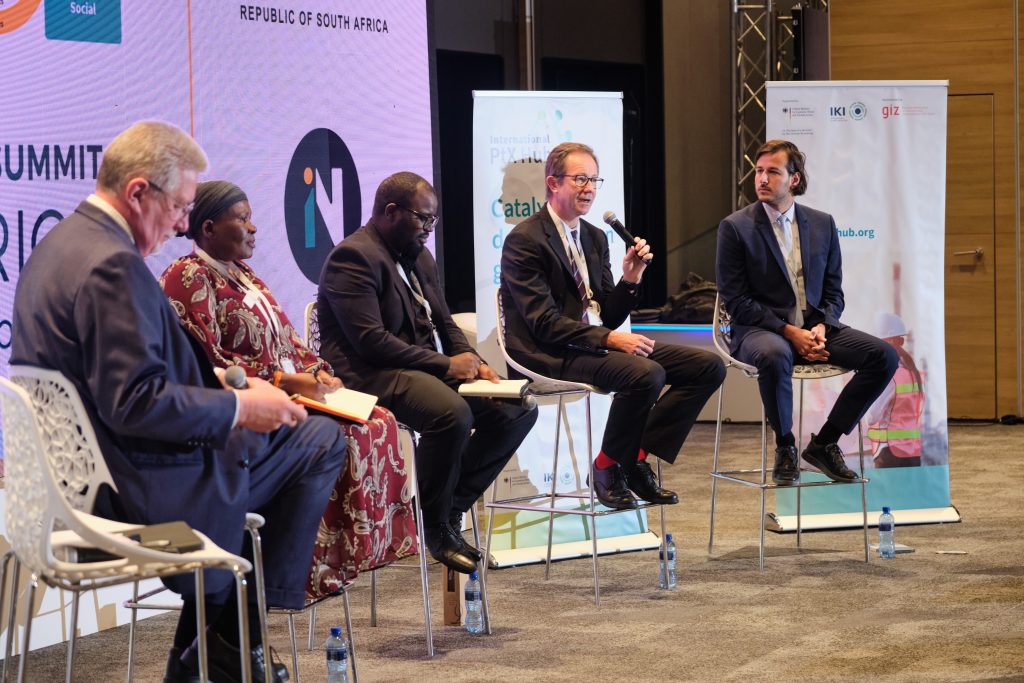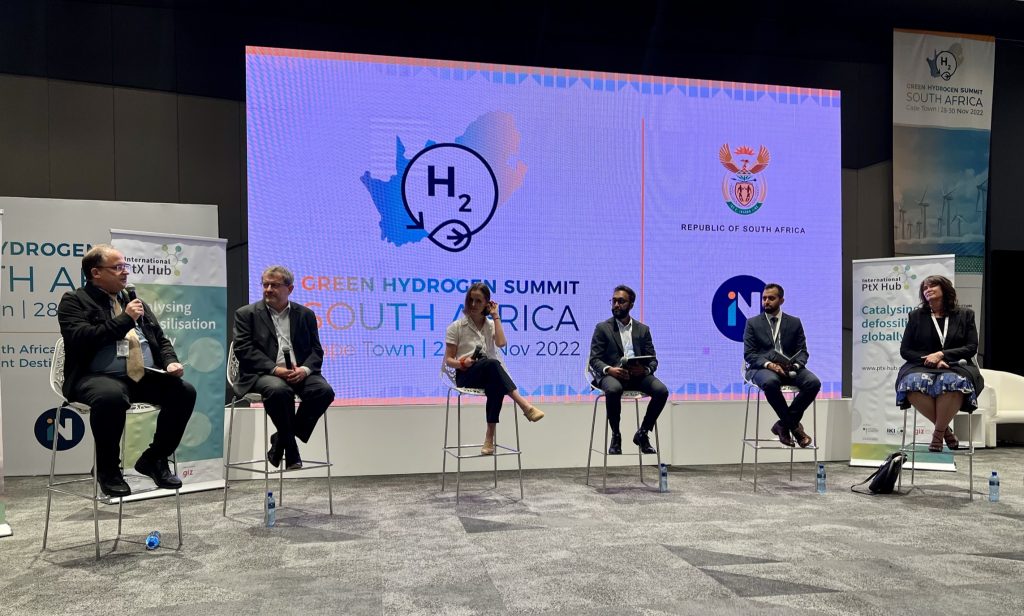South Africa is on its way to become a leading green hydrogen production hub and investment destination. To showcase it’s potential, the country hosted the first-ever South African Green Hydrogen Summit (SAGHS) in the last week of November. Decision makers, international experts and organisations met in Cape town to network and discuss the future of Power-to-X.
The PtX Hub hosted two sessions at the SAGHS to facilitate exchange between experts on sustainability criteria and the availability of data as two building blocks of South Africa’s future Power-to-X economy.
Sustainability requirements and international frameworks
Power-to-X is key to reach climate neutrality and can offer huge economic opportunities for producing countries. To ensure that the transition contributes to economic prosperity, social justice and environmental integrity, sustainability criteria are essential. On the first day of the SAGHS, PtX Hub’s session was dedicated to how such criteria and international frameworks could look like.
In the opening remarks, Heino von Meyer, Lead Sustainability & Global Relations at the International PtX Hub, stated that all sectors need to be involved in reducing CO2 emissions. He emphasised that green hydrogen and its derivatives are crucial for those industries and transport sectors that cannot be directly electrified. Following, Heino von Meyer introduced the scoping paper on Power-to-X sustainability, developed by the PtX Hub. It proposes a conceptual framework with four sustainability dimensions: E-nvironmental, E-conomic, S-ocial and G-overnance.

“Regulating parenting standards are needed to guarantee that green hydrogen is produced and transported safely and reliably from its source to actual use,” argued Laurens Cloete, Senior Consultant at the Rebel Group South Africa. He further outlined that South Africa does not yet have comprehensive regulatory regimes for green hydrogen. According to him, consistent and transparent green hydrogen certificates for the entire value chain would also lead to economic success.
In support, Farai Chireshe, Energy Analyst at WWF, stated that regulations and standards should allow for traceability of green hydrogen’s origin. Only in this way certification schemes can ensure that hydrogen is truly green.
Gian Wieck, Senior Policy Advisor at the German Federal Ministry for Economic Cooperation and Development (BMZ), explained that there are many available international standards that can be adopted and used.

“The international standards could assist and guide production requirements. They must be in place before anything could happen,” stated Makoma Lekalakala, Director of Earthlife Africa. She also pointed out that the local context of green hydrogen production sites must be taken into account. Farai Chireshe added that energy access and water issues as well as job creation must be adressed within those affected communities.
Watch the full session here.
Better data for better decisions
As a nascent sector, decision makers have limited experience with green hydrogen and Power-to-X. This is where data comes into play. But how is high-quality data collected and best used for decision-making? To answer this question, the PtX Hub invited experts from academia and the private and public sector to share their insights on day two of the SAGHS.
“If one does not know data, then they do not have proper decisions and only have projects that yield failure as a result,” Dr Hubert Joynt, Head of the Centre of Excellence of Infrastructure South Africa, opened the session.
At the outset, Zaffar Hussain, PtX Lead South Africa at Agora Energiewende, explained that his work focuses on the demand side and explores the use cases and opportunities for green hydrogen. He continued that the aim is to enable decision-makers to accurately assess their country’s competitive advantage in the marketplace with as little guidance as possible.

Celest Renaud, Meridien Economics Analyst, went on to emphasise that access to quality data helps to understand the real issues and risks and to target interventions to address them. Dr Thomas Roos, Principal Research Engineer at the Council for Scientific and Industrial Research (CSIR), added that end use data is important for this. According to him, data must be precise and able to connect with realities on the ground.
From an academia perspective, Dr Anicia Peters, Head of the Namibian Green Hydrogen Institute, mentioned that there is a need for upskilling and reskilling. Data should be interrogated and clearly communicated to the communities, so they understand what the figures really mean.
“Data can be leveraged to de-risk and gain a concrete advantage in a project. Therefore, scenarios or best approaches need to be used in decision making,” Kesh Mudaly, Boston Consulting Group (BCG) Principal, concluded the session.
Watch the full session here.
The organisation of the SAGHS was supported by GIZ South Africa, especially H2.SA, funded by the German Federal Ministry for Economic Cooperation and Development (BMZ), and the International PtX Hub South Africa.
